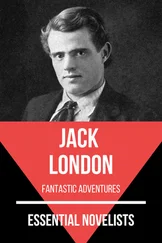Jack London - John Barleycorn
Здесь есть возможность читать онлайн «Jack London - John Barleycorn» весь текст электронной книги совершенно бесплатно (целиком полную версию без сокращений). В некоторых случаях можно слушать аудио, скачать через торрент в формате fb2 и присутствует краткое содержание. Жанр: Классическая проза, на английском языке. Описание произведения, (предисловие) а так же отзывы посетителей доступны на портале библиотеки ЛибКат.
- Название:John Barleycorn
- Автор:
- Жанр:
- Год:неизвестен
- ISBN:нет данных
- Рейтинг книги:3 / 5. Голосов: 1
-
Избранное:Добавить в избранное
- Отзывы:
-
Ваша оценка:
- 60
- 1
- 2
- 3
- 4
- 5
John Barleycorn: краткое содержание, описание и аннотация
Предлагаем к чтению аннотацию, описание, краткое содержание или предисловие (зависит от того, что написал сам автор книги «John Barleycorn»). Если вы не нашли необходимую информацию о книге — напишите в комментариях, мы постараемся отыскать её.
John Barleycorn — читать онлайн бесплатно полную книгу (весь текст) целиком
Ниже представлен текст книги, разбитый по страницам. Система сохранения места последней прочитанной страницы, позволяет с удобством читать онлайн бесплатно книгу «John Barleycorn», без необходимости каждый раз заново искать на чём Вы остановились. Поставьте закладку, и сможете в любой момент перейти на страницу, на которой закончили чтение.
Интервал:
Закладка:
"Before you can go out on the road and learn the more complicated and higher details of the profession," he said, "you will, of course, have to work in the car-house with the men who install and repair the motors. (By this time I was sure that it was his daughter, and I was wondering how much stock he might own in the company.)
"But," he said, "as you yourself so plainly see, you couldn't expect to begin as a helper to the car-house electricians. That will come when you have worked up to it. You will really begin at the bottom. In the car-house your first employment will be sweeping up, washing the windows, keeping things clean. And after you have shown yourself satisfactory at that, then you may become a helper to the car-house electricians."
I didn't see how sweeping and scrubbing a building was any preparation for the trade of electrician; but I did know that in the books all the boys started with the most menial tasks and by making good ultimately won to the ownership of the whole concern.
"When shall I come to work?" I asked, eager to launch on this dazzling career.
"But," said the superintendent, "as you and I have already agreed, you must begin at the bottom. Not immediately can you in any capacity enter the car-house. Before that you must pass through the engine-room as an oiler."
My heart went down slightly and for the moment as I saw the road lengthen between his daughter and me; then it rose again. I would be a better electrician with knowledge of steam engines. As an oiler in the great engine-room I was confident that few things concerning steam would escape me. Heavens! My career shone more dazzling than ever.
"When shall I come to work?" I asked gratefully.
"But," said the superintendent, "you could not expect to enter immediately into the engine-room. There must be preparation for that. And through the fire-room, of course. Come, you see the matter clearly, I know. And you will see that even the mere handling of coal is a scientific matter and not to be sneered at. Do you know that we weigh every pound of coal we burn? Thus, we learn the value of the coal we buy; we know to a tee the last penny of cost of every item of production, and we learn which firemen are the most wasteful, which firemen, out of stupidity or carelessness, get the least out of the coal they fire." The superintendent beamed again. "You see how very important the little matter of coal is, and by as much as you learn of this little matter you will become that much better a workmanmore valuable to us, more valuable to yourself. Now, are you prepared to begin?"
"Any time," I said valiantly. "The sooner the better."
"Very well," he answered. "You will come to-morrow morning at seven o'clock."
I was taken out and shown my duties. Also, I was told the terms of my employmenta ten-hour day, every day in the month including Sundays and holidays, with one day off each month, with a salary of thirty dollars a month. It wasn't exciting. Years before, at the cannery, I had earned a dollar a day for a ten-hour day. I consoled myself with the thought that the reason my earning capacity had not increased with my years and strength was because I had remained an unskilled labourer. But it was different now. I was beginning to work for skill, for a trade, for career and fortune, and the superintendent's daughter.
And I was beginning in the right wayright at the beginning. That was the thing. I was passing coal to the firemen, who shovelled it into the furnaces, where its energy was transformed into steam, which, in the engine-room, was transformed into the electricity with which the electricians worked. This passing coal was surely the very beginning-unless the superintendent should take it into his head to send me to work in the mines from which the coal came in order to get a completer understanding of the genesis of electricity for street railways.
Work! I, who had worked with men, found that I didn't know the first thing about real work. A ten-hour day! I had to pass coal for the day and night shifts, and, despite working through the noon-hour, I never finished my task before eight at night. I was working a twelve-to thirteen-hour day, and I wasn't being paid overtime as in the cannery.
I might as well give the secret away right here. I was doing the work of two men. Before me, one mature able-bodied labourer had done the day shift and another equally mature able-bodied labourer had done the night-shift. They had received forty dollars a month each. The superintendent, bent on an economical administration, had persuaded me to do the work of both men for thirty dollars a month. I thought he was making an electrician of me. In truth and fact, he was saving fifty dollars a month operating expenses to the company.
But I didn't know I was displacing two men. Nobody told me. On the contrary, the superintendent warned everybody not to tell me. How valiantly I went at it that first day. I worked at top speed, filling the iron wheelbarrow with coal, running it on the scales and weighing the load, then trundling it into the fire-room and dumping it on the plates before the fires.
Work! I did more than the two men whom I had displaced. They had merely wheeled in the coal and dumped it on the plates. But while I did this for the day coal, the night coal I had to pile against the wall of the fire-room. Now the fire-room was small. It had been planned for a night coal-passer. So I had to pile the night coal higher and higher, buttressing up the heap with stout planks. Toward the top of the heap I had to handle the coal a second time, tossing it up with a shovel.
I dripped with sweat, but I never ceased from my stride, though I could feel exhaustion coming on. By ten o'clock in the morning, so much of my body's energy had I consumed, I felt hungry and snatched a thick double-slice of bread and butter from my dinner pail. This I devoured, standing, grimed with coal-dust, my knees trembling under me. By eleven o'clock, in this fashion I had consumed my whole lunch. But what of it? I realised that it would enable me to continue working through the noon hour. And I worked all the afternoon. Darkness came on, and I worked under the electric lights. The day fireman went off and the night fireman came on. I plugged away.
At half-past eight, famished, tottering, I washed up, changed my clothes, and dragged my weary body to the car. It was three miles to where I lived, and I had received a pass with the stipulation that I could sit down as long as there were no paying passengers in need of a seat. As I sank into a corner outside seat I prayed that no passenger might require my seat. But the car filled up, and, half-way in, a woman came on board, and there was no seat for her. I started to get up, and to my astonishment found that I could not. With the chill wind blowing on me, my spent body had stiffened into the seat. It took me the rest of the run in to unkink my complaining joints and muscles and get into a standing position on the lower step. And when the car stopped at my corner I nearly fell to the ground when I stepped off.
I hobbled two blocks to the house and limped into the kitchen. While my mother started to cook, I plunged into bread and butter; but before my appetite was appeased, or the steak fried, I was sound asleep. In vain my mother strove to shake me awake enough to eat the meat. Failing in this, with the assistance of my father she managed to get me to my room, where I collapsed dead asleep on the bed. They undressed me and covered me up. In the morning came the agony of being awakened. I was terribly sore, and, worst of all, my wrists were swelling. But I made up for my lost supper, eating an enormous breakfast, and when I hobbled to catch my car I carried a lunch twice as big as the one the day before.
Work! Let any youth just turned eighteen try to out-shovel two man-grown coal-shovellers. Work! Long before midday I had eaten the last scrap of my huge lunch. But I was resolved to show them what a husky young fellow determined to rise could do. The worst of it was that my wrists were swelling and going back on me. There are few who do not know the pain of walking on a sprained ankle. Then imagine the pain of shovelling coal and trundling a loaded wheelbarrow with two sprained wrists.
Читать дальшеИнтервал:
Закладка:
Похожие книги на «John Barleycorn»
Представляем Вашему вниманию похожие книги на «John Barleycorn» списком для выбора. Мы отобрали схожую по названию и смыслу литературу в надежде предоставить читателям больше вариантов отыскать новые, интересные, ещё непрочитанные произведения.
Обсуждение, отзывы о книге «John Barleycorn» и просто собственные мнения читателей. Оставьте ваши комментарии, напишите, что Вы думаете о произведении, его смысле или главных героях. Укажите что конкретно понравилось, а что нет, и почему Вы так считаете.











